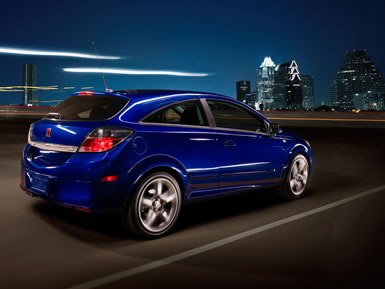|

CAR REVIEW:
Saturn was created by GM to take on the Japanese, Toyota and Honda
especially, with a well made compact sedan and coupe. Saturnís were
built in America in a brand new, state of the art factory, in the quaint
little town of Spring Hill, Tennessee by dedicated workers. Models
featured polymer side panels that bounced back after being hit by a
shopping cart.
There were no model
badges on the cars, and no grille either! Also missing, and notable in
its absence, was identification with GM. Saturn, technically a
subsidiary, debuted as a new manufacturer, not just a new brand.
The first cars were
good, but not great, however sales went well. High resale values made
used Saturnís virtually the same price as used ones. Some fit-and-finish
issues popped up at first and the original foam-cast four-cylinder
engines were surprisingly noisy.
People loved their
Saturnís. In 1995 a five-year reunion at Spring Hill attracted thousands
of the Saturn faithful for a rainy but happy party.
Sadly, after the big
hoopla, GM increasingly neglected the brand while it turned its
attention to building higher profit trucks and SUVs. By the early 21st
century, Saturn really needed some help, and finally got it, but not
from where youíd expect. Spring Hill and plastic body panels are no
longer in the mix. Today, from the Sky roadster to the Aura sedan to the
Vue compact SUV, Saturnís design and much of itís manufacturing, is
European. Thatís different, and for driving enthusiasts, itís a good
thing.
My Black Sapphire Astra
three-door hatchback, with its standard 17-inch rims, chrome-barred
grille, and clear taillamp lenses, felt and looked much cooler than the
dowdy Ion it replaced. And it was far removed from its ďSLĒ series
ancestors.
Saturn offers three and
five door Astra hatchbacks. Hatchbacks are candy to European motorists,
for whom SUVs are rare, and high gas prices have been a fact of life for
decades, not months. Saturn Astras are built in Antwerpen, Belgium ,
alongside the nearly identical European Opel Astra.
The five-door Astra
comes in two models, XE and the better-equipped XR. The three-door, the
sportier of the two, comes only as an XR model. This is not a stripped,
base model vehicle. It has four-wheel disc brakes with antilock, and the
Stabilitrak traction control system is standard. Stabilitrak works with
the brake system to keep the car moving in the right direction under bad
road conditions and emergency situations.
You also get things
such as remote keyless entry, tire pressure monitor, rain sensing
windshield wipers, cruise control, steering wheel audio controls, and a
driver information center. In fact, my tester had only one option, an
upgraded audio system with seven speakers, a CD changer and a graphic
equalizer.
Inside, the Astra feels
European, as you might expect. Thereís plenty of good quality gray
plastic, with a texture resembling a basketballís skin. The center
information screen is small and deeply inset. I think a larger
navigation system could fit there if ordered. Thereís a handsome chrome
Saturn logo on the steering wheel. The firm, deeply bolstered seat
features manual lumbar adjustment. I found no cupholders up front, a
European design decision.
All Astras come with a
1.8-liter Ecotec 140-horsepower four-cylinder engine with dual overhead
cams and variable valve timing. A five-speed manual transmission is
standard with a four-speed automatic optional. The standard combination,
combined with the XRís sport-tuned suspension, makes for a highly
amusing motoring experience.
The Astra drives like
Volkswagen Golf, and thatís not surprising, as the two cars are direct
competitors in the European market. Thereís firmness to the ride and a
directness to the controls thatís refreshing in a car in this segment.
Cruising the freeway is quite quiet, with little road rumble, and no
wind noise to speak of.
The Astra with manual
earns fuel economy ratings from the EPA of 24 City, 32 Highway, I
averaged 24.6 mpg. The EPAís Green Vehicle Guide handed out a 7 for Air
Pollution and a Greenhouse Gas score of 8, putting the Astra on the
desirable Smartway list.
Rear visibility is
compromised by a slit like rear window, and the ďPassenger Airbag OffĒ
light in the rearview mirror was distracting, but I found little else to
complain about.
Astras start at just
$16,495 for the five-door XE. My XR three-door, with the optional audio
system and delivers, came in at $19,090. Thatís a pretty modest price in
todayís car market. And a senior executive at my day job, who owns a
Porsche 911, admired the Astra as I parked it.
Maybe Saturnís on to
something here. But the brandís ad campaign, stressing ďrethinking,Ē may
still be a bit ahead of the publicís awareness of Saturn. Now a
full-fledged division of GM, Saturn has evolved into the corporationís
European everyman brand. Anyone who actually drives the Saturn Astra
will be grateful that GM is bringing over these cars.
By Steve
Schaefer ©
AutoWire.Net
Byline: CAR Review
provided by Tony Leopardo © AutoWire.Net

Saturn Home Page
Column Name: Maybe
Saturnís on to something here
Topic: The 2008 Saturn
Astra
Word Count: 881
Photo Caption: The
2008 Saturn Astra
Photo Credits: Saturn
Astra Internet Media
Series #: 2008 - 44
Download
the Microsoft Word version here:
2008 Saturn Astra
Download the Original Image File here:
2008 Saturn Astra


|
